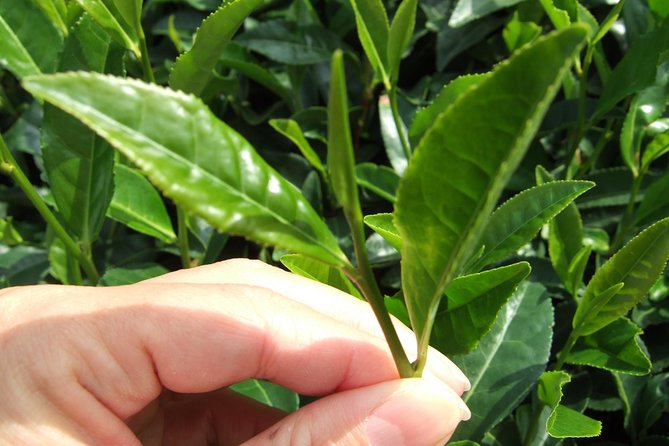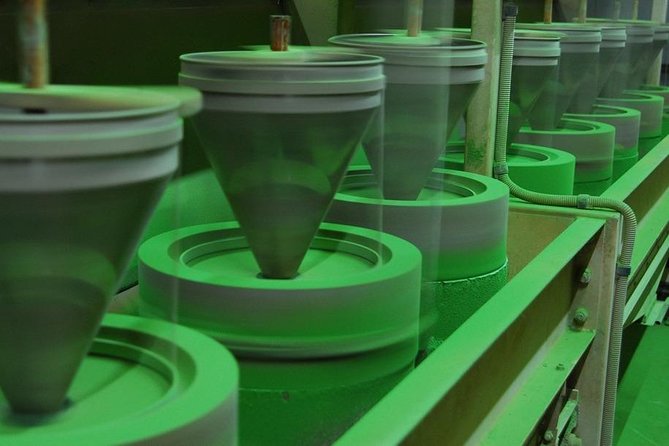Matcha green tea has a rich cultural history in Japan, tracing its roots back to the 12th century. Today, visitors can enjoy this centuries-old tradition through an exclusive guided tour. Explore a picturesque tea plantation, marvel at the meticulous processing techniques, and discover the purported health benefits of this vibrant superfood. But the experience doesn’t end there – savor the exquisite flavors of premium Matcha varieties and indulge in traditional Japanese sweets. With flexible departure times and a thoughtful cancellation policy, this tour offers a truly captivating glimpse into the world of Matcha that is not to be missed.
Key Points

- Tour of one of Japan’s oldest tea plantations to observe the meticulous cultivation and processing techniques of premium Matcha green tea.
- Exclusive tasting of multiple Matcha varieties paired with traditional Japanese sweets at the Matcha production factory.
- Exploration of Matcha’s rich cultural heritage, distinctive flavor, vibrant color, and purported health benefits.
- Guided walk through the lush, verdant tea fields and learning about the skilled harvesting of tender tea leaves.
- Flexible departure times, small group size, and professional English-speaking guide for a personalized Matcha experience.
It's also worth checking out some other tours and experiences nearby.
Overview of Matcha Green Tea
Matcha green tea was first introduced to Japan by a Zen monk in the 12th century, marking the start of its rich cultural heritage within the country.
This powdered form of green tea has since become an integral part of Japanese tea ceremonies, revered for its distinctive flavor, vibrant color, and purported health benefits.
Today, visitors can enjoy the world of premium Matcha through a guided tour of one of Japan’s oldest tea plantations.
Here, they’ll learn about the meticulous cultivation and processing methods that go into crafting the finest Matcha, followed by an exclusive tasting of multiple Matcha varieties alongside traditional Japanese sweets.
Guided Tour of Tea Plantation

The guided tour begins with a visit to one of Japan’s oldest tea plantations, where visitors can witness the meticulous cultivation and processing techniques that go into crafting the finest Matcha.
Guests are guided through the lush, verdant tea fields, learning about the skilled harvesting of the tender tea leaves.
At the on-site Matcha factory, the group observes the intricate process of steaming, drying, and grinding the leaves into a fine, vibrant green powder.
The tour culminates in an exclusive tasting, where participants savor the complex, umami-rich flavors of several premium Matcha varieties, paired with traditional Japanese confections.
This insider’s look provides a deeper appreciation for the art and tradition behind this revered green tea.
Matcha Production at the Factory
At the factory, visitors observe the intricate process of transforming freshly harvested tea leaves into the vibrant green Matcha powder.
First, the leaves are carefully steamed to preserve their fresh flavor and nutrients. They’re then dried and ground into a fine powder using a centuries-old stone mill.
This slow, meticulous grinding ensures the Matcha retains its distinctive sweet, umami taste. Visitors learn how the mill’s rotation speed and pressure must be precisely controlled to achieve the desired texture and consistency.
They also discover how the factory sorts and packages the different Matcha grades for specialized uses, from ceremonial-grade to culinary-grade.
Throughout the tour, the guide emphasizes Matcha’s unparalleled quality and the pride the factory takes in its time-honored production methods.
Exploring Matcha’s Health Benefits
After observing the intricate Matcha production process, visitors gain a deeper appreciation for the tea’s exceptional health benefits. Matcha is renowned for its potent antioxidant properties, with its concentration of catechins – a type of antioxidant – far exceeding that of regular green tea.
| Matcha Health Benefits | Description |
|---|---|
| Antioxidants | High concentration of catechins, which help neutralize free radicals. |
| Energy Boost | Caffeine and L-theanine work synergistically to provide a steady energy boost without the jitters. |
| Improved Focus | L-theanine enhances alpha wave production, promoting calm alertness. |
| Immune Support | Nutrients like vitamin C, selenium, and zinc bolster the immune system. |
| Weight Management | Matcha may help boost metabolism and fat burning. |
Exclusive Matcha Tasting Experience
Elevating the senses, the Exclusive Matcha Tasting Experience offers visitors a captivating journey through the nuanced flavors and aromas of this revered Japanese green tea.
Guided by experts, guests will sample a variety of premium Matcha selections, each with its own distinct profile. From the vibrant, grassy notes of ceremonial-grade Matcha to the subtler, umami-rich variants, the tasting allows for a deeper appreciation of Matcha’s complexity.
Complemented by an array of traditional Japanese sweets, the experience provides a holistic sensory exploration, revealing the exquisite balance of flavors that define this centuries-old tea.
Whether a seasoned Matcha connoisseur or a curious newcomer, this exclusive tasting promises to expand one’s understanding and enjoyment of this revered beverage.
Pairing Matcha With Japanese Sweets
The harmonious pairing of Matcha green tea and traditional Japanese sweets elevates the senses, creating a captivating sensory experience. The subtle, umami-rich notes of Matcha complement the natural sweetness and delicate textures of Japanese confections, resulting in a harmonious balance of flavors and a thoroughly enjoyable tasting journey.
| Matcha Variety | Recommended Pairing |
|---|---|
| Ceremonial Grade | Mochi |
| Culinary Grade | Wagashi |
| Organic Matcha | Daifuku |
| Hojicha Roasted Matcha | Dorayaki |
| Matcha Latte | Anmitsu |
Flexible Departure Times and Logistics
With flexible morning or afternoon departure times, travelers can conveniently fit the Matcha green tea experience into their Kyoto itinerary.
The guided tour departs from the Hotel Granvia Kyoto, located right at the JR Kyoto Station, ensuring easy access for participants. The tour ends back at the meeting point, making it a hassle-free experience.
Groups are limited to a maximum of 6 travelers, providing a more intimate and personalized experience. This small-group format also allows the professional English-speaking guide to provide more attentive service.
Travelers can easily plan their day, as the tour is cancellable up to 24 hours in advance for a full refund, though cancellations less than 24 hours before the start may not be eligible for a refund.
Cancellation Policy and Weather Conditions
Travelers can easily cancel their Matcha green tea experience up to 24 hours in advance for a full refund, though cancellations less than 24 hours before the start may not be eligible for a refund.
The tour may also be canceled due to poor weather conditions.
In the event of severe weather, the tour operator reserves the right to cancel the experience for the safety of guests. This decision is made with careful consideration and isn’t taken lightly.
Travelers will be notified as soon as possible if a cancellation is necessary, and will receive a full refund.
The tour is designed to operate rain or shine, but extreme conditions may require rescheduling to ensure an enjoyable and comfortable experience.
Here's a few more nearby tours and experiences we think you'll like.
Frequently Asked Questions
What Is the Ideal Water Temperature for Brewing Matcha?
The ideal water temperature for brewing matcha is around 175-185°F (80-85°C). This temperature range helps bring out the full flavor and aroma of the powdered green tea leaves without burning them and resulting in a bitter taste.
How Long Should Matcha Be Whisked for the Perfect Froth?
The ideal whisking time for the perfect matcha froth is around 60-90 seconds. Whisk the powder vigorously in a circular motion, incorporating air to create a smooth, creamy texture with a layer of rich, dense foam on top.
Can Matcha Be Stored for an Extended Period?
Matcha can be stored for an extended period, but it’s best consumed within a few months of purchase. Proper storage in an airtight container in a cool, dark place helps preserve the tea’s flavor and nutrients for longer.
Is Matcha Gluten-Free and Suitable for People With Dietary Restrictions?
Matcha is typically gluten-free and suitable for people with dietary restrictions. However, it’s essential to check the product label for any additional ingredients that may contain gluten or other allergens.
What Is the Recommended Serving Size for Daily Matcha Consumption?
The recommended serving size for daily matcha consumption is typically 1-2 teaspoons. Consuming matcha in moderation is generally safe, but individuals with certain health conditions should consult their healthcare provider before incorporating it into their diet.
Not for you? Here's more of our most recent tour reviews happening neaby
- Cebu Highland Tour: Temple of Leah, Little Kyoto, and Dinner
- Arashiyama Self Guided Tour App Multilingual Audio Guide
- Self-Drived Audio Guide Kioto Philosophers Route
- Self-Drived Audio Guide Route to Kiyomizu Temple
- Fushimi Inara-Taisha Imaginary Experience
- Kyoto Imaginary Experience
- Kyoto: Timeless Majesty of Fushimi Inari Shrine Audio Guide
- Cool Volunteers: Join With Local Residents to Share Manners
- West Kyoto in One Day: A Self-Guided Audio Tour in English
- Kyoto : The Only Guide
- Kyoto: Hidden Gems Morning Walk in Sakyo With a Local Guide
- Kyoto: Kimono Rental With Traditional Japanese Garden & Room
- Summer Only: Grinding & Arranging Matcha Experience
- Kyoto Kimono Rental Mimosa | Kimono/Yukata Rental Kids Plan
- Kyoto: Gion District at Night Guided Group Walking Tour
Recap
This guided tour offers a unique opportunity to take in the rich cultural heritage of Matcha green tea.
Visitors can explore a centuries-old tea plantation, observe the intricate production process, and savor the vibrant flavors of premium Matcha varieties.
The experience also includes insights into Matcha’s purported health benefits and a chance to indulge in traditional Japanese sweets paired with the exquisite tea.
